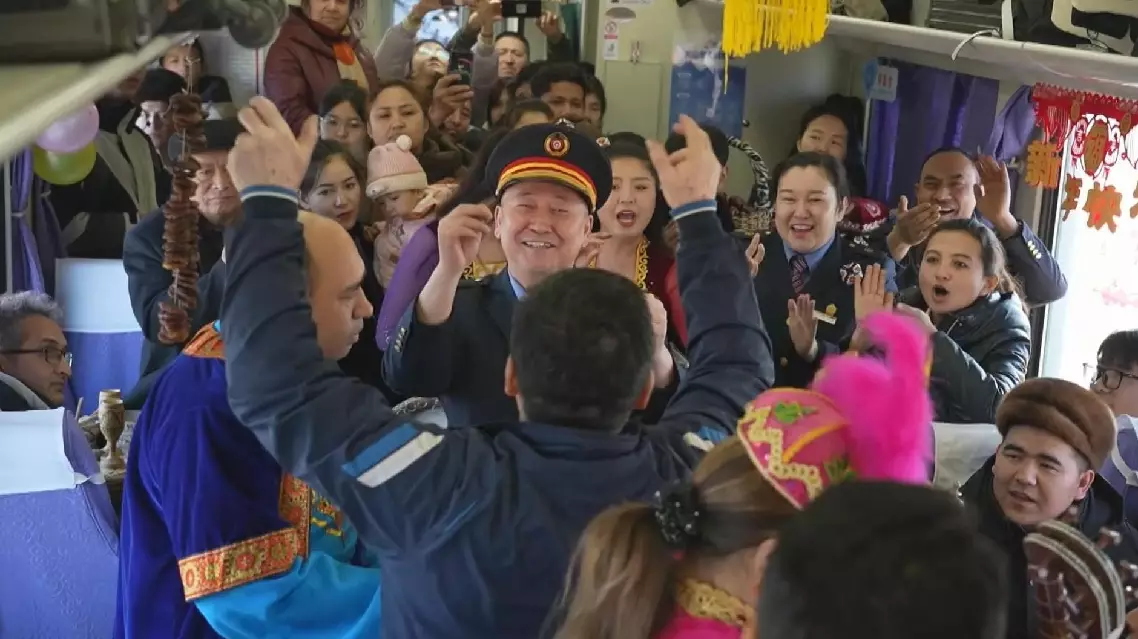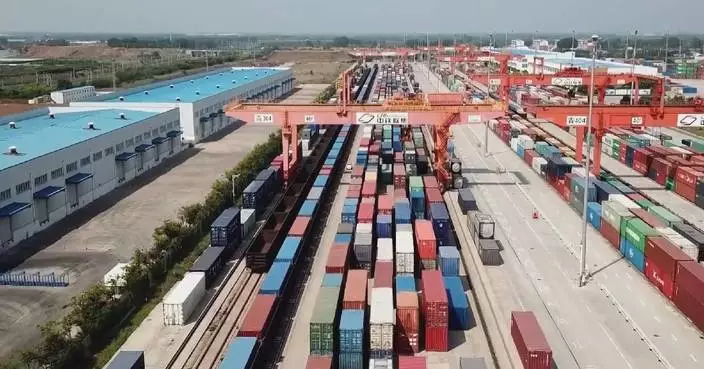In a world where speed and comfort often guide travel choices, a rail service in northwest China's Xinjiang Uygur Autonomous Region offers passengers a chance to experience a slower pace.
Train No. 7557 carries hundreds of passengers each day from Urumqi, the regional capital, to southern Xinjiang's Hotan Prefecture, linking 22 cities and counties in the less developed region.
While most bullet trains in China travel at speeds exceeding 250 kilometers per hour, the slow train in Xinjiang runs at an average speed of less than 80 kilometers per hour. The entire journey covers a distance of 1,960 kilometers and lasts over 32 hours.
Located in the southernmost part of Xinjiang, Hotan is a remote area where sandstorms and dust dominate, and poor transportation infrastructure has posed challenges to residents. The slow train service was launched in 2011 and soon gained popularity.
Fares range from 4 yuan (55 U.S. cents) to 361 yuan, with some sections being significantly cheaper than bus or car alternatives.
However, slowness is not the only distinctive feature of this train service. Unlike high-speed trains that restrict strong odors, Train No. 7557 provides passengers with a unique feast of smells, as vendors selling local specialties such as fruits, flowers, yogurt and kebabs move between carriages.
Some refer to the train service as a "mobile bazaar," with the word "bazaar" meaning "market" in Uygur.
Xinjiang benefits from abundant sunshine and significant diurnal temperature variations, which create favorable conditions for the cultivation of fruits and vegetables. Local produce such as apricots, grapes, melons, apples, fragrant pears, pomegranates, figs and peppers are renowned far and wide, and sell well on the train service.
These fresh specialties not only bring bright colors and tempting aromas to the train, but also create a pathway out of poverty for farmers living along the railway.
Since 2021, the service has reserved specific carriages and launched regular mobile bazaars to help residents sell their agricultural products. During the summer and autumn seasons, people living along the route bring homegrown fruits, vegetables and other local specialties to sell to passengers. Over 180 registered farming households have earned money from selling their products on the train.
Compared to trains in major cities, the atmosphere of Train No. 7557 is much busier, alive with the calls of vendors and the chimes of mobile payments. Some vendors even livestream their sales, turning the train into a platform for e-commerce.
Passengers can also purchase Xinjiang's unique musical instruments and handicrafts aboard the service, and spontaneous performances from vendors are occasionally heard.
47-year-old Polatkhan, head of the train service crew, is the person behind the initiative to launch regular mobile bazaars in 2021.
"Many farmers in southern Xinjiang need our help, so I thought, why not assist them in selling their agricultural products on our slow train? When the Party branch in Korla heard my idea, they approved it and offered strong support," said Polatkhan.
During the Spring Festival holiday, Polatkhan specially invited local artists to perform at the mobile bazaars, creating a lively and festive atmosphere. Performers dressed in traditional ethnic attire danced in the aisles, while red calligraphy couplets and intricate paper cuttings adorned the windows.
"I really don't want to get off; I am so happy," said one passenger.
"I really like this mobile bazaar. There are passengers from all over the country and from different ethnic groups on the train. Through this bazaar, my agricultural products can be sold nationwide," said a local farmer.
At every mobile bazaar, Polatkhan assists farmers in selling their goods.
"I'm a native of Xinjiang, and I've been working on this route in southern Xinjiang for more than 10 years. Over the years, I've witnessed the gradual progress of our farmers in southern Xinjiang. To be honest, more than a decade ago, there was nothing in front of Pishan Railway Station or Yecheng Railway Station -- just the Gobi Desert and sand. But now, it's all high-rise buildings. I want to help as many farmers as I can within my scope of work. This is my greatest wish," Polatkhan said.
Mobile bazaars during the Spring Festival holiday usually sold all the products brought by the farmers in less than two hours.
"Once their products are sold out, I especially enjoy dancing with them to celebrate. Sometimes, when I'm really happy, words can't fully express my feelings. The best way for me to express myself is through dance, just like other people in Xinjiang," said Polatkhan.
According to the Xinjiang railway department, the southern Xinjiang railway transported 326,200 passengers in the first nine days of 2025, an increase of over 14,000 from the same period last year.
For passengers, the slow train service is more than just a mode of transport. It is an economic lifeline for locals and a cultural hub for visitors, and a vital link connecting the hinterland to the outside world.

Slow train service fuels commerce, community in southern Xinjiang









